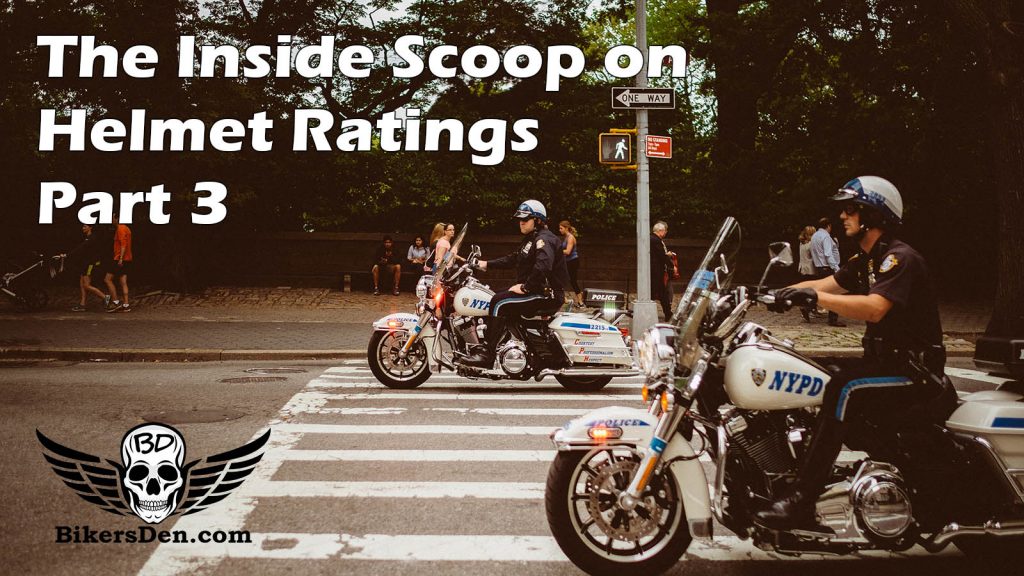
You’re screwed. You just got pulled over in another state (or province) on the scoot and you know you did what the cop is writing you a ticket for. For whatever reason, though, he’s being a hardass on you, so now, instead of just signing the ticket and going on about your business, he’s looking over all your gear.
And now he’s looking at your helmet.
Is it legal?
For all you fruitcakes with swap-meet stickers on the back of novelty helmets, you start to worry about this point. But what if you have a legal motorcycle helmet that carries a SNELL 2015 rating and NOT a DOT sticker?
How do you know the law AND educate the cop on the side of the road (or the judge a month later?)
First things first: You need to know the law – the real law, not what your buddy “Spider” told you over beers three years ago.
Less than an hour from where I live is the southernmost state in the U. S., Florida. Technically, if you’re over 21, you can ride with no helmet … if you can prove that you have insurance coverage of over $10,000 in case of an accident.
So who the hell knows how to do that? Well, for starters, simply having a copy of your policy in your bags or with your other insurance and registration paperwork, should be enough. I’ve rolled through a couple of roadblocks in Florida over the years, with and without helmet, and never been asked to provide proof of medical coverage. Could I?
Absolutely.
I print out a copy of my medical policy and keep it with my license, bike insurance, and registration.
Since I’m pretty close to the border of a couple of different states, I’m pretty clear on the laws in them as well as my own. For extended trips, I usually take a few minutes one night to look up all the oddball stuff I might get on a longer ride if, for example, I’m going to ride to Texas, like I did a couple years ago to get my toy hauler.
Texas views it’s helmet law as a secondary tier infraction, meaning the police can’t stop because you don’t have on a helmet (Texas is similar to Florida in it requires riders over 21 to have completed a motorcycle safety course and have health insurance in case of an accident.)
One of the three smart things I’ve done in my life is to keep the paperwork on my helmet in my bags. Yes, I’m an ex-cop, and that cuts through a lot of crap if I’m pulled over, but I’m also not inclined to pay fines or go to court if I can avoid it. For me, it’s easier to be able to respectfully show a cop – especially a younger guy who might not know everything he should – that yes, SNELL 2015 is also considered DOT-compliant. You can tell somebody something 28 times, but if they can see it in print once, not from you, they are more inclined to believe it.
But let’s be real for a second, can we?
Johnny Law didn’t pull you over because of a sticker on your lid. He pulled you over for speeding, or drag racing, or doing something dumb. You poured fuel on the fire by parking on the edge of the road where cars are whipping right past the cop and by being a prick to him. By the time he gets up to you, he’s already mad as a mashed cat and now, he’s smelling the beer on your breath and that’s it … he’s going to throw the book at you.
Maybe you did just have two beers. Maybe you do have a concealed carry permit. Maybe, maybe, maybe.
Maybe not.
No cop can know ALL the laws, and what they taught us in the Academy all those years ago was this: “You’re here to protect and serve, it’s up to the judge to figure it out.”
As in, “write the ticket, make the arrest, issue the citation, and let the truth come out in court.”
On the other hand, if you, as the rider, can be respectful and educational about the laws that govern us as riders, you’ll likely find most cops only glance at even the smallest half helmets for the “DOT” sticker and move on. I’ve never had a problem with a cop I didn’t cause and it’s worth remembering that a little education and preparation on your part can go a long way towards peace on the side of the road or in a roadblock.
